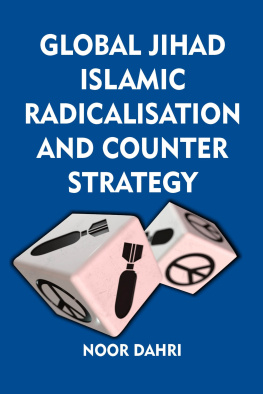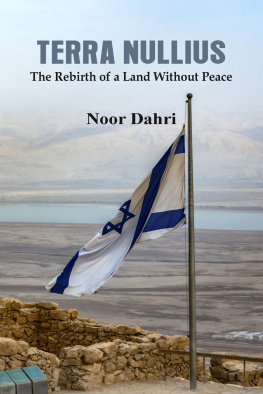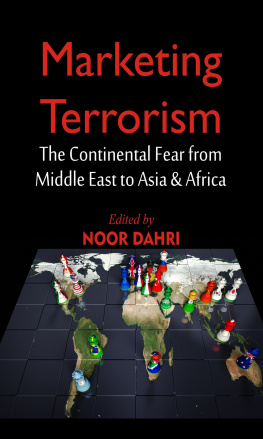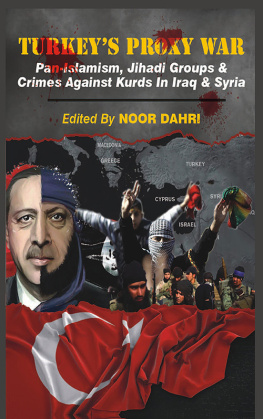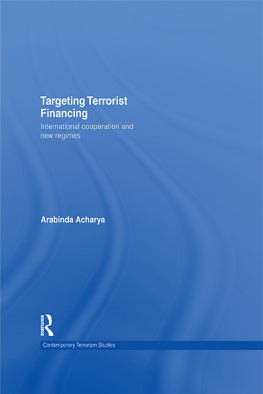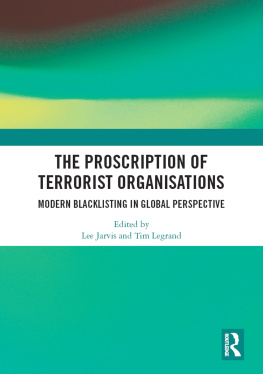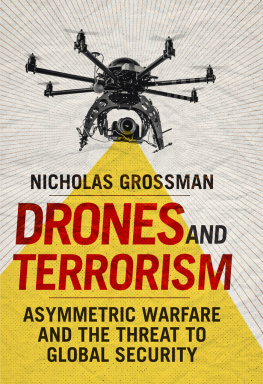Published by
Vij Books India Pvt Ltd
(Publishers, Distributors & Importers)
2/19, Ansari Road
Delhi 110 002
Phones: 91-11-43596460, 91-11-47340674
Mob: 98110 94883
E-mail:
Web: www.vijbooks.in
Copyright 2021, Author
ISBN: 978-93-90439-62-1 (Hardback)
ISBN: 978-93-90439-64-5 (Paperback)
ISBN: 978-93-90439-65-2 (ebook)
All rights reserved.
No part of this book may be reproduced, stored in a retrieval system, transmitted or utilized in any form or by any means, electronic, mechanical, photocopying, recording or otherwise, without the prior permission of the copyright owner. Application for such permission should be addressed to the publisher.
The views expressed in this book are of the contributors/authors in their personal capacity.
The edited volume is a collaborative project and I am fortunate to have been able to edit the comprehensive and deep research of leading academics and analysts from different countries to provide a global spotlight on the growing security and national threat of Islamist organisations such as Ikhwan ul Muslimeen, IRGC and Hezbollah in the Middle East as well as across the globe. I would like to thank sincerely the participating authors who consented to give me the permission to publish their research and rich contributions that undoubtably make this a more authoritative volume.
My final and greatest thanks to my family, who understood and supported me throughout the entire process; and in particular, my wife, Farah, and my children Barirah and Bayyinah, who had to give up a great deal of quality time with their father while this book was being written.
My special appreciation to my best friend Musa Khan Jalalzai for his unwavering support and help in editing and publishing this book.
Muslim Brotherhood
The first modern political Islamic movement Jamiyyat al-Ikhwan al-Muslimin (Muslim Brotherhood) was born in Egypt in 1928 by its founder Hasan al-Banna (1906-1949). The main objectives of Ikhwan were based on spiritual reformation as well as social welfare in youth within a society such as physical training, sports, religious and ideological indoctrination, national pride, resistance against foreign domination and establishing a state under the Sharia rule.
Ikhwan Administrative Structure
The MB established a network of the social and religious centres in approximately every city and village of the country and this was the basic push for their organisations support and establishing public support. Members of the organisation showed their great loyalty to the branches
Ikhwan Milestones
The pressure mounted from hardcore militant members of the organisation upon Hasan al Banna to start a military campaign against the Egyptian regime to overthrow the government. In 1939 dissenters broke off within the organisation to from the militant branch, named as Mohammads Youth. In around 1940, Hasan al Banna formed a secret department within the organisation, Tanfidah which means Execution as a secret military branch of the organisation. The militant members of the organisation forced al Banna to form such special apparatus earlier than he might have chosen to form later when he kept its profile exceptionally low during the period of the Second World War.
The Role & Ideology of Qutb in Ikhwan
Sayyid Qutb was born in 1906 to his father who was a landowner as well as a political activist, holding a weekly meeting to discuss the political matters. When Qutb was at the age of 23, he moved to Cairo for his further education in a British style institution before starting his new job as a teacher in the ministry of Public Instruction. He was a highly intelligent young man and was keen to learn everything he had interest in. He devoted himself with literature and became a critic author that motivated him to write novels. He then started encountering the work of many famous scholars, including the word of Nobel Prize winner French Eugenicist Alexis Carrel. For his criticism, he soon became famous around his entire circle as he has a charismatic character to attract people through his writings and speeches.
The latest wave of political Islamist terrorism that wrapped the world with the blood of innocents which started in 20th century to onwards actually is an ideology of Qutbism. The leading member of 20th centurys political Islamic ideologue was Sayyid Qutb of Egypt, who joined the Muslim Brotherhood (Ikhwan ul Muslimoon) in the 60s after completing his educational tour in the USA arranged by the Egyptian Government being an employee.
The deeper study of the ideology of Sayed Qutb finds that he was a more revolutionist than a Jihadist. He struggled all his second phase of life against the sinful (according to his thoughts) and corrupt Muslim regimes such as the tyranny Egyptian government. He did not advocate terrorism directly, according to his speeches and writings that seems that he was interested in to wage a non-violent Jihad against the cruel and corrupt Muslim states. It is claimed by some academic scholars that todays Jihadist ideology is far different than the ideology that Qutb introduced in the 20th century. He was an Islamic theorist who introduced the revolutionary theory in his movement which unfortunately later turned into the revolutionist ideology of Islamist Jihadism.
According to a PhD scholar, El-Sayed el-Aswad:
Despite the existence of common and shared components between Qutbs views and the ideology of present Islamists, and despite the impact of Qutbs thought on the latters ideology, there are fundamental differences between them. This implies that despite the radical trend of Qutbs writings and teachings portraying Islam as a force opposing Western secular imperialism, Qutb did not support the wide-ranging and indiscriminate violence advocated locally by the Egyptian jihadist groups of the 1970s and 1980s, and globally by the extreme Islamists of global jihad like Bin Laden and Ayman al-Zawahiri operating through al-Qaeda. For Qutb, jihad must be directed toward sinful and corrupt Muslim regimes.
But the question is this that how would a certain group wage a Jihad against the sinful and corrupt Muslim regimes? The only answer would come in a mind is armed struggle and, in this struggle, terrorists would indiscriminately target civilians by calling them Taghut tyranny or the followers of tyrant regimes. In this case, his writings intentionally or unintentionally promoted terrorism under the banner of just Jihad.
Sayyid Qutb was an intellectual individual who was already known for his writings well before joining the Ikhwan movement. He authored a book named Social Justice in Islam in 1940s. During these years Qutb visited the USA for his further training where he expressed his hateful and negative thoughts towards the American materialistic culture, as opposed to the spiritual and moral culture of Islam. His political and religious struggle was changed from an Islamic scholar to a social revolutionist after returning from the US where he spent nearly two years and, in those years, he transformed himself from a religious scholar to a radical revolutioanist.
In 1953, the year after the revolution of the Egyptian Free Officer, he joined the Ikhwan ul Muslimoon (Muslim Brotherhood). In the beginning, he and his members of the Ikhwan movement supported Egyptian ruler Gamal Abdel Naser but later his relations with Gamal Naser deteriorated when he did not accept the Islamic Political Orientation. After a year of Qutbs joining the Ikhwan, Gamal Naser survived from the bloodied attempt of his assassination in 1954, that blamed on Ikhwan which forced them to go underground and that was the time when the journey from the ideological conflict to a social revolution between the Ikhwan and Egyptian government started. The period from 1954 to 1960 was an era that changed the political arena of Egypt from political and social reform to a bloodiest revolution.


